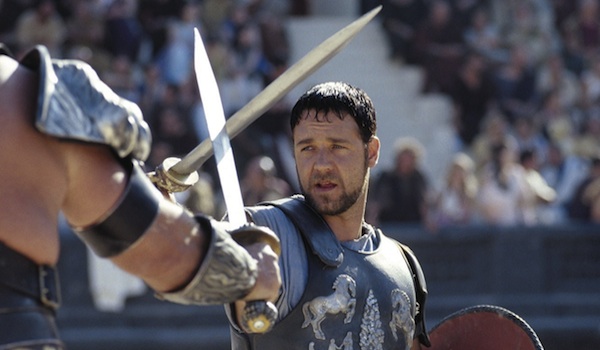Gladiator Review
I don’t think the hate heaped on “Gladiator†for winning Best Picture is fair. Was it the best film of 2000? Absolutely not (the best film of the year was Requiem for a Dream, while the best nominated film was probably “Traffic). I think “Gladiator†is everything it should be—entertaining, exhilarating, and for the most part, mindless. It’s just a fun popcorn movie—something that wouldn’t be especially memorable had it not been labeled the best film of its year.
The strength of the Roman Empire is peaking. Under the Emperor Marcus Aurelius (Richard Harris), Rome’s armies are expanding into Germanic territory. The leader of the army is General Maximus (Russell Crowe), a no-nonsense, tough-as-nails warrior who is extremely close with and loyal to the Emperor. The Emperor’s son, Commodus (Joaquin Phoenix), is Maximus’ polar opposite. He is spoiled and cowardly, and he has a poor relationship with his father. Everyone, including the Emperor himself, know it will soon be time to crown a new ruler, and Aurelius decides what would be best for Rome is to return her to her roots—end the monarchy and give political control back to the Senate. He asks Maximus to carry out his plan, and the general obliges. But Commodus gets wind of the plan and kills his father before a formal announcement can be made.
Maximus is sentenced to death for not recognizing Commodus as Rome’s rightful heir, but he escapes, only to be captured again and made a slave. He is bought by Proximo (Oliver Reed), who trains him to be a gladiator, something Maximus excels at. Soon, he and his new men are on their way to Rome to fight in the Coliseum, but Maximus has only revenge on his mind.
What “Gladiator†does best shouldn’t be surprises. The costumes, art direction, etc. are top-notch, and the action scenes are exciting and well-choreographed. The film suffers from a lack of originality, falling back on cliché after cliché. But if you take away the lofty expectations of this having to be as good as past Best Picture winners, it’s hard not to enjoy yourself.
Besides Best Picture, the film also walked away with a Best Actor statue for its star, Crowe. I have to be honest—I’ve never been a huge fan of Crowe as an actor. For the most part, he plays the same one-note, tough-guy character over and over again (exceptions being “Cinderella Man†and “The Insiderâ€), and this film is no different. There really isn’t anything remarkable or Best Actor-worthy here, but at least he makes Maximus charismatic enough that we can believe his transformation from slave to hero of the Roman people.
The supporting cast is great, easily outshining Crowe. I’d say the best performance came from the late Oliver Reed. Proximo is also the best-written character, so that helps, but Reed’s performance is complex and interesting. Richard Harris isn’t around long enough to make a major impression. Djimon Hounsou is on-hand in the thankless role of Maximus’ fellow slave (he’s good, but the character is kind of useless). And Joaquin Phoenix is devilishly good as Commodus, who is one of the more memorable villains I’ve seen in a while.
“Gladiator†certainly isn’t the worst Best Picture winner ever, but it’s far from the best. It happened to come out in a year lacking big critical and commercial hits, so it was able to linger in people’s memories through the fall and winter until it took home the prize. But that’s no reason to hate on it. Hate on the Academy instead, for this film is actually quite a lot of fun.
















